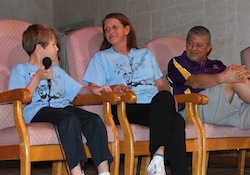Written by Cherri Foytlin, an oil worker’s wife, mother of six, Louisiana resident, and journalist whose family has been deeply impacted by the BP Oil Disaster. She co-founded Gulf Change, a citizen’s action coalition, blogs for Bridge the Gulf Project, and walked to Washington D.C. from New Orleans to call for justice for those who continue to suffer from the BP Deepwater Drilling Disaster. This dispatch is cross-posted from www.BridgeTheGulfProject.org.
